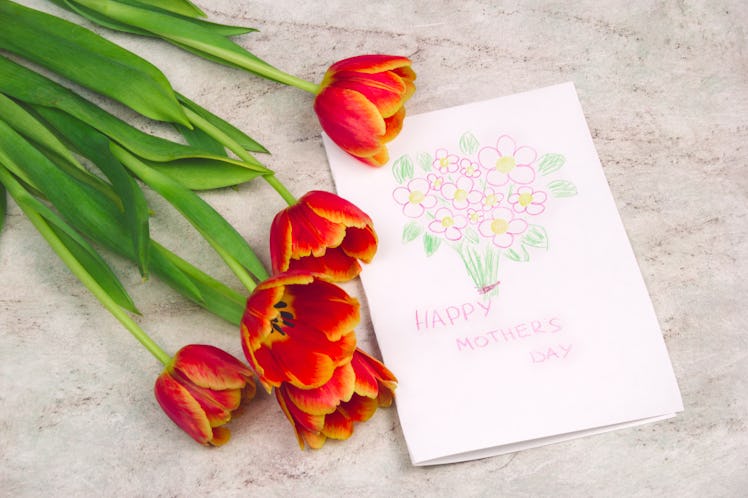
Keep This In Mind When Sending A Mother's Day Card During Quarantine
Mother's Day celebrations will look a little different this year amidst the coronavirus pandemic. Thankfully, abiding by social distancing measures doesn't mean you can't still show the mother figures in your life how much they mean to you. Popping a card in the mailbox is one easy way to show you care, but you might be wondering if it's safe to send your mom a card for Mother’s Day 2020. Here's what you should know.
Keeping your mom safe is top of mind when it comes to reimagining Mother's Day celebrations during this time, so sending a card seems like a great way to stay connected while keeping your distance. When it comes to the spread of the novel coronavirus, the current information from the Centers for Disease Control and Prevention (CDC) cites the expulsion of respiratory droplets during person-to-person contact as the main method of transmission. As of April 28, the guidance from CDC on the risk of contracting the virus through the mail is that the novel coronavirus "is unlikely to be spread from domestic or international mail, products or packaging."
According to a study published in The New England Journal of Medicine on March 17, the virus can survive up to 72 hours on plastic and less than 24 hours on cardboard, but that doesn't mean you'll contract the virus by coming in contact with a possibly infected surface. Rachael Piltch-Loeb, Ph,D, a preparedness fellow at Harvard's T.H. Chan School of Public Health, tells Elite Daily the time it takes to send a card helps lower the risk of spreading any traces of the virus. Piltch-Loeb explains, "If the virus was on a package you sent, whether it was sent in cardboard or plastic, it would likely break down as it traveled through unstable conditions like the heat and cold in a truck or plane," she says.
You can also rest assured the United States Postal Service (USPS) is taking extra precautions during this time. USPS outlined the precautionary steps its taking to protect employees and customers as of April 30. They include having employees wear face masks, implementing more rigorous sanitizing procedures, and conducting contactless delivery with no person-to-person contact when possible.
Even with safety measures in place, Piltch-Loeb recommends, "Out of an abundance of caution, it makes sense for your mom to wash her hands before opening the [card], wash her hands again after opening, and then remove the [card] item from the [envelope]." In this case, she'll want to discard the envelope immediately and make sure not to touch her face while handling the card.
On your end, avoid licking the envelope to seal it. This isn't because of a risk to yourself from licking the envelope, but rather, it's a precautionary measure. In March 2020, Washington's Secretary of State department asked residents to use alternative methods such as a wet sponge or cloth to avoid the possibility of asymptomatic individuals contaminating envelopes with their saliva. Karen Levy, Ph.D, MPH, an environmental microbiologist and epidemiologist and associate professor of environmental health at Emory University's Rollins School of Public Health, previously told Elite Daily, "There is good evidence to suggest that people with no symptoms can transmit the virus." Even though the likelihood of transmission from an envelope to a person is low, an asymptomatic individual could put the mail carrier and the recipient at risk.
The precautions might sound like a bit much, but it's better to be overcautious when it comes to your health. Yes, your Mother's Day festivities will look a little different this year, but you can still show mom how much you care by sending love from afar.
If you think you’re showing symptoms of coronavirus, which include fever, shortness of breath, and cough, call your doctor before going to get tested. If you’re anxious about the virus’s spread in your community, visit the CDC for up-to-date information and resources, or seek out mental health support. You can find all Elite Daily's coverage of coronavirus here.
Experts cited:
Rachael Piltch-Loeb, Ph.D, preparedness fellow at the Harvard T.H. Chan School of Public Health
Karen Levy, Ph.D, MPH, Associate Professor of Environmental Health at Emory University's Rollins School of Public Health